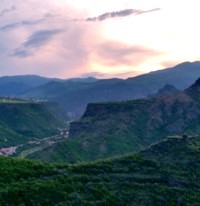Gremi
Our next stop was at the town of Gremi, once the capital of the Kingdom of Kakheti and a well-known trading town on the Silk Road. Until the 17th century Gremi was largely populated by Armenian Christians but in in 1615 the city was completely destroyed by the armies of Shah Abbas I of Persia and was effectively abandoned. The heavily fortified Church of the Archangels Michael and Gabriel alone survived the attack. Another hill to climb.
The Church of the Archangels
Following its destruction by invading Muslims the nearby town of Gremi never recovered its former fame or glory
There are more images in the Georgia Album See more...
Many of us in the secular West are unaware that both Testaments of the Bible demand that women should be modestly dressed as women (not in men's clothing) and cover their hair when in a holy place. Like other rules still observed by Jews and Muslims these are often ignored in many Christian societies today. Yet here in Georgia, where there has been an eighteen hundred year struggle with Islam, the same rules apply when entering a church as when entering a mosque. Scarfs are provided to cover heads and skirts to put around pants (men's clothes).
Throughout this trip, organised by ExPat Explore, the accommodation was generally of a high standard. Members of our tour were particularly enamoured of this night in a four star country-club resort with an excellent buffet-style breakfast.
Overnight accommodation - among the best - no golf was played

